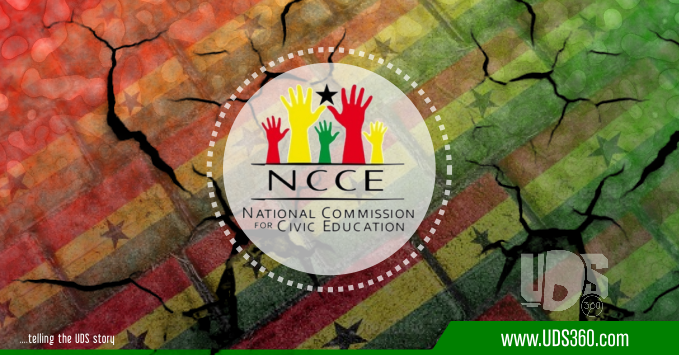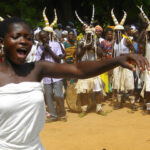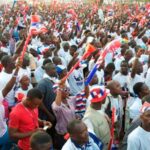Information makes impacts. The principles and beliefs of people are mostly shaped and affected by their exposure and these are basically information consumed and the experiences encountered.
How well has the state improved on its communications with its citizens? The National Commission for Civic Education (NCCE) whose mandate is to educate citizens on decisions of the state and actions by the state, has really failed Ghanaians.
Following operations of the NCCE; they seem overwhelmed, have lost focus and don’t know what to do. In simple terms, they lack strategy or are incompetent for the tasks assigned them.
What is NCCE and what is its role in governance?
The NCCE,( National Commission for Civic Education) has its core mandate to deliver quality civic education to all Ghanaians and works towards strengthening Ghana’s democracy in the following thematic areas:
• Educating citizens on the Constitution of Ghana
• Education on Human Rights
• Promotion of Peacebuilding, Conflict Resolution, and Children’s Rights
• Promoting Political and Religious Tolerance
• Promotion of Inclusiveness and Participation of Marginalized Groups (e.g. women, people with disabilities etc.)
• Education on Sustainable Management of the Environment (Voter Education)
• Research and Studies on Democratic Development
Key Works of the NCCE so far with regards to its core mandate
• NCCE AND NATIONAL PEACE COUNCIL COLLABORATE TO MAINTAIN PEACE IN KUMASI
• NATIONAL CATHOLIC SECRETARIAT ENGAGES NCCE ON “I SHAME CORRUPTION” PROJECT
• NCCE SUPPORTS MOOT COURT COMPETITION WITH 70 COPIES OF 1992 CONSTITUTION
• A DELEGATION FROM APRM VISITS NCCE
• NCCE celebrates ……… Day
My question to the NCCE is, in what ways are they educating the vulnerable mass Ghanaians on their constitutional fundamental human rights, and how to appreciate democracy as well as promoting a peaceful and violence-free atmosphere.?
Obviously, the NCCE over the years has been reactional as compared to being proactive. They have been impressive in sensitizing on proper election conducts and procedures. For that reason, it wasn’t shocking for me to read from Wikipedia that,
“The work of the NCCE comes to the fore during election years in Ghana when thorough public education is done to sensitize electorates about the procedures involved in voting and their conducts before, during and after presidential and public elections”.
I have hoped that, for a National Commissions mandate with civic education, we should be seeing more mass educational campaigns, monitoring the enforcement of human right laws on a national scope.
In spite of the rate at which violation cases are reported as against the human rights of vulnerable group LGBTI, the NCCE is yet to educate us on the subject matter. This act of discrimination can also be seen by their research survey carried out. So far, it had focused on women and elections (voters) which had even reflected the neglect of other vulnerable groups as PWDs and the LGBTIs by the state. If the NCCE would attach the same passion to equal protection of human rights from violence for all as it’s been done with the election campaigns, Ghanaians would be bound to appreciate the fundamental human rights of everyone and how to protect them as well.
I am therefore tempted to ask on how the NCCE’s civic agenda correlated with sustaining Ghana’s democratic gains. And also on addressing gaps with Ghana’s communication and commitments at the international level.
In the face of the protection of human rights and advocacy campaign for vulnerable groups like LGBT, you would find a lot of misconception gaps. My engagement with the African Center for International Law and Accountability (ACILA) had been my eye-opener.
ACILA is concerned on monitoring Commitments that the African States have made at the international level including communications made and recommendations accepted by the state of Ghana on human right issues involving the vulnerable group, and to pursue equal protection from violence of all citizens.
ACTIVITIES UNDERTAKEN BY ACILA TO EDUCATE AND CREATE AWARENESS
1. Capacity Building for 300 editors in 10 regions through editors’ encounters
2. Capacity building for 180 mid-career Reporters
3. Capacity building for 60 Bloggers at the northern and southern belt sectors on domestic and international human right laws. Trained a fair representation to cover across the country. In attendance were participants from Accra, Volta, Ashanti, Eastern region, Northern region, Brong Ahafo, Central, Upper East, and Upper West region. The training took place in Accra and Kumasi respectively.
4. Panel discussions about dealing with persons with disabilities in Kumasi and also at the University of Professional studies in Accra, Capacity building for the Criminal Justice system was also talked about.
5. Establishing a Human Rights Defenders’ organization in Ghana for the first time in Ghana since the declaration was made to the effect 20years ago, using the participants of the capacity building programs as the core members.
6. Developing a Dashboard for human right defenders to post and discuss human right issues.
7. Anti-corruption; Capacity building and empowerment through AIJ Fund, and Corruption Watch program partnering Joy FM, Adom, CDD Ghana, GII, and GACC respectively.
FINDINGS
• ACILA has conducted the first-ever survey and documented the only research findings on violence activities against vulnerable groups extending to LGBTIs in Ghana. ACILA has also submitted the first and only research document on Human rights record and equal protection from violence to all citizens. This was from the findings gathered from the opinions and reactions to the protection of human rights against vulnerable groups specifically the LGBTIs. It was carried out in 5 regions within the country namely Volta region, Ashanti region, Western region, Northern and Greater Accra region.
• ACILAs’ panel discussions, capacity building activities and campaigns on equal protection under the law has helped to harness support from the justice system and the media as well as professionals in education and awareness creation of the general public
• ACILA has through their engagements provided education, capacity building, career advancement, employment opportunities as well as opportunities for inclusions to influencing policy decisions on the fundamental human rights protection of all persons
• Recognition by ACILA as human right defenders has given voice to many advocates and victims to speak out on issues affecting the human right protection of the vulnerable group
• ACILA is set to also conduct progress survey after 2 years to track if opinions are shifting, and also measure impact results.
My engagements had enlightened me on the International Human Right laws and the Universal Periodic Review. The modalities and scope of the UPR and some recommendations that Ghana accepted over the period at the UPR with the subsequent result impact on human right protection.
Drawing from the experiences and the knowledge gained, there have been reportages and advocacy publications to promote non-discrimination and human rights protection which are yielding positive results.
Concerning a publication by Fred Duhoe, below is an article that was written by a human right defender on the protection of human rights of all persons from violence extending to LGBTIs.
Hi Fred,
Please, what human right are u making noise about? Evil is evil, if LGBTI issues are human right issues, then thieves and armed robbers should be left alone to operate. TO ME, TO LIVE IS CHRIST, AND TO DIE IS AGAIN. -11:57 AM, 23RD DECEMBER 2018.
How has the NCCE helped in addressing such misconceptions of Ghanaians or on educating the mass on what the constitutional provisions are with regards to the subject matter?
How do Citizens know that Ghana has committed to the protection of LGBTIs?
How does one get an education to separate constitutional fundamental human rights provisions of LGBTIs from Section 104B of the law which makes it a crime to have anal sex or unnatural carnal knowledge or forceful sexual relations?
How do Citizens know that Ghana has committed to the protection of LGBTIs at the Universal Periodic Review(UPR)?
How many even know about UPR and implications on member states?
How do the people know that the Commission for Human Rights and Administrative Justice has instituted a DRS to help address such gaps?
The National Commission for Civic Education has failed Ghanaians.
NCCE needs to step up on its core mandates. For lack of knowledge our people perish and would continue to perish. It’s the comparison to the situation of a native foreigner driving in its native environment. This situation has resulted in Ghanaians being foreigners in their own lands, lost and without having an understanding of the roadmaps which could have led to the avoidance of “preventable” violence/accidents.
Truly, ACILA of 3years of incorporation has done and is doing what NCCE hasn’t been able to achieve over the numerous years since its incorporation. The NCCE simply has failed Ghanaians. It has become a white elephant suffering from the lack of constitutional provisions of separation of powers and should be dissolved.
On the way forward, Government of Ghana should engage and collaborate with ACILA to continue to build capacity, create awareness and educate the mass on protecting the fundamental human rights of all persons
The government should Empower ACILA with the capacity to monitor the rule of law to work on issues affecting human rights protection and access to legal aid support systems for underprivileged vulnerable groups
With ACILA establishing the human right defenders’ organization, the first in this country had given the platform for advocates and change makers opportunity to voice out and speak on issues affecting human rights of vulnerable groups. I can envision this platform actually evolving to provide a safe haven for the vulnerable groups where they would feel comfortable and safe to open up to receive healing, counseling, and support without the feeling of stigma and discrimination.
ACILA is empowering and giving support to Human right activists
Through my encounter with ACILA, I have built confidence to speak up when I encounter cases of abuse and violations against people’s fundamental human rights, discrimination, and violence.
I am hoping for a policy review as far as civic education is concerned.
Finally, I would recommend to ACILA to telecast its educational campaigns intensively.
Knowledge is power. Ghanaians need to know!
By AFETSI GLADYS
gladys.afetsi@gmail.com








